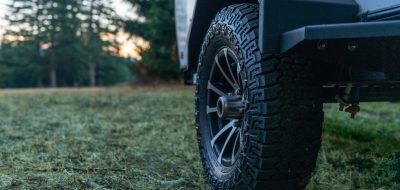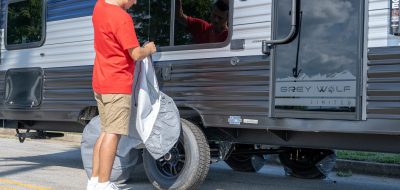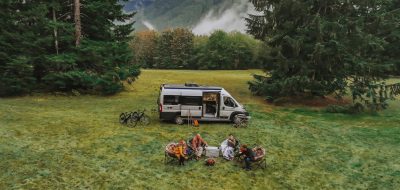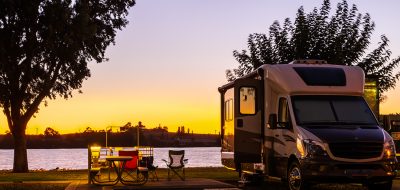 Play It Safe When You Head Out to Play
Play It Safe When You Head Out to Play
Keeping your family and your property safe on the road is a top priority when you head out on an RV or camping trip. Staying safe is easy when you make the right preparations. Here are some tips to make sure your next trip results in only good memories.
Alarms
Did you know that most manufacturers recommend that you replace your smoke, LP, CO and fire alarms every five years? Test all your gas, smoke and fire alarms regularly, and replace the batteries at least twice per year. If you replace your home smoke and fire alarm batteries when Daylight Saving Time begins and ends, do the same with your RV alarms.
Fire Extinguisher
Make sure you have at least one fire extinguisher on board your RV – and that it works. Select your fire extinguisher by the type of fire it is designed to put out. Make sure you have a suitable extinguisher for kitchen fires at a handy location in the galley.
Another extinguisher for electrical or engine compartment fires should be easily accessible in the cockpit of a motorized RV or in the tow vehicle you use to pull your travel trailer or 5th wheel
Electrical Protection
If you don’t already have a surge protector built into your coach’s electrical system, get a portable model that simply plugs in at the power pedestal. These devices can save you from having to replace your RV’s major appliances (refrigerator, microwave, TV, Air conditioner) if park power is unstable or insufficient. Make sure the models are available for both 30-amp and 50-amp RV electrical systems.
Water Purity
To help ensure that the water coming from your RV faucet is clean and free of harmful microbes or cysts, change the filter on your under-sink or exterior in-line water filtration system. Most filters should be changed at least once per year, more often if you use your RV year-round or full-time. Check the manufacturer’s instructions on how many gallons the filter is designed to process before it should be replaced.
Tire Pressure
The number one cause of blow-outs is too-low tire pressure. Check tire pressures daily while on the road, and before leaving on any camping trip. A tire pressure monitoring system is a handy way to keep an eye on every tire on your RV or towing configuration. Make sure you have a good quality tire gauge in every vehicle and use it regularly. A portable air compressor is also handy for quick top-ups anywhere without having to search for a fuel station with an air hose that will reach all your tires.
Anti-Theft Protection
Equip your RV, tow vehicle or dinghy with anti-theft devices, such as hidden battery cut-offs, steering wheel locks, trailer coupler locks, locking chocks for tandem wheels and kingpin locks for 5th wheels. Thieves won’t bother with vehicles that are too much trouble to get into or drive off.
Stay in Control
Upgrade your RV, tow vehicle or dinghy with equipment that improves handling and driver control, such as sway controls, steering stabilizers, load-levelers such as air springs, weight distributing hitches and auxiliary braking systems. A hard-to-handle trailer or RV can result in driver fatigue and accidents caused by shoulder drop-offs, the inability to steer around an obstacle or not being able to stop in time.






